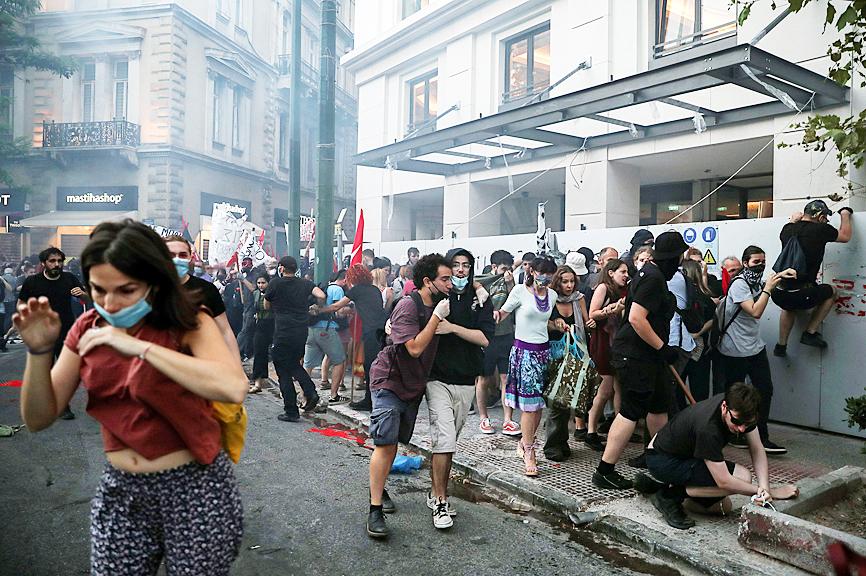Violence broke out late on Thursday in Athens at a mass demonstration against a new law to curb public protests, leaving six police officers injured.
A group of protesters hurled gasoline bombs at riot police outside the Greek parliament, while police responded with tear gas and flash grenades.
Police said that they arrested nine people and detained 15 others for questioning.

Photo: Reuters
Demonstrations were held in Athens and dozens of other Greek cities to oppose plans by the center-right government.
The bill was approved by 187-101 votes in parliament.
More than 10,000 protesters had gathered in central Athens, many supporting a labor union backed by the Greek Communist Party.
A separate group of several dozen youths was involved in the violence that sent other demonstrators, including families with young children, scrambling to move away from the clouds of tear gas.
Greek Prime Minister Kyriakos Mitsotakis’ year-old conservative government said that it is determined to stop small protest gatherings from disrupting traffic and commercial activity.
“The right to hold peaceful gatherings must be protected ... but it must be done in a way that will not interrupt the activity of an entire city,” Mitsotakis told parliament on the second and final day of debate.
Critics of the proposed reforms include the Athens Bar Association and parliament’s own legislative review committee.
They said that plans to prosecute protesters attending unsanctioned rallies and to hold protest organizers responsible for damage caused if rallies turn violent are legally troublesome.
The government said that it added several clarifications to the bill to address those concerns.
Opposition leader and former Greek prime minister Alexis Tsipras said that the government introduced the measures to allow heavy-handed policing, predicting that the pandemic-driven recession would trigger large labor protests in the fall.
“You fear what is coming — the reaction of society, the anger of society — and that is why you are preparing to give us repression,” Tsipras told parliament.

‘IN A DIFFERENT PLACE’: The envoy first visited Shanghai, where he attended a Chinese basketball playoff match, and is to meet top officials in Beijing tomorrow US Secretary of State Antony Blinken yesterday arrived in China on his second visit in a year as the US ramps up pressure on its rival over its support for Russia while also seeking to manage tensions with Beijing. The US diplomat tomorrow is to meet China’s top brass in Beijing, where he is also expected to plead for restraint as Taiwan inaugurates president-elect William Lai (賴清德), and to raise US concerns on Chinese trade practices. However, Blinken is also seeking to stabilize ties, with tensions between the world’s two largest economies easing since his previous visit in June last year. At the
Nearly half of China’s major cities are suffering “moderate to severe” levels of subsidence, putting millions of people at risk of flooding, especially as sea levels rise, according to a study of nationwide satellite data released yesterday. The authors of the paper, published by the journal Science, found that 45 percent of China’s urban land was sinking faster than 3mm per year, with 16 percent at more than 10mm per year, driven not only by declining water tables, but also the sheer weight of the built environment. With China’s urban population already in excess of 900 million people, “even a small portion

UNSETTLING IMAGES: The scene took place in front of TV crews covering the Trump trial, with a CNN anchor calling it an ‘emotional and unbelievably disturbing moment’ A man who doused himself in an accelerant and set himself on fire outside the courthouse where former US president Donald Trump is on trial has died, police said yesterday. The New York City Police Department (NYPD) said the man was declared dead by staff at an area hospital. The man was in Collect Pond Park at about 1:30pm on Friday when he took out pamphlets espousing conspiracy theories, tossed them around, then doused himself in an accelerant and set himself on fire, officials and witnesses said. A large number of police officers were nearby when it happened. Some officers and bystanders rushed

Beijing is continuing to commit genocide and crimes against humanity against Uyghurs and other Muslim minorities in its western Xinjiang province, U.S. Secretary of State Antony Blinken said in a report published on Monday, ahead of his planned visit to China this week. The State Department’s annual human rights report, which documents abuses recorded all over the world during the previous calendar year, repeated language from previous years on the treatment of Muslims in Xinjiang, but the publication raises the issue ahead of delicate talks, including on the war in Ukraine and global trade, between the top U.S. diplomat and Chinese